
You must have heard and read about VoIP and how it is revolutionizing the way we communicate. While the nature of work is changing, desk phones are becoming obsolete and VoIP is taking over. It has made our lives much simpler. But is it devoid of drawbacks? Well, this blog post will take a balanced approach as we examine the VoIP advantages and disadvantages. By the end of this post, you will be able to decide whether VoIP is the calling solution you have been waiting for, helping you make an informed decision for your business communication needs.
We will start with the basics of VoIP first.
What is VoIP and How Does it Work?

Voice Over Internet Protocol, or VoIP, is the technology using which we make and receive calls over an internet connection instead of a traditional phone line. Let’s understand the concept of VoIP technology with the help of some real-life examples.
Suppose you use a VoIP application like Skype to make a call to a colleague. As the call gets connected and you speak into your microphone, your voice or audio message is converted into digital data. The digital data is in the form of small packets that zip across the internet to Skype’s servers. From there, these data packets are routed to your colleague’s device, on which he is using Skype. Data packets are reassembled and converted back into analog signals. It is then that your colleague hears your voice in real-time.
Not only voice calling, but VoIP technology is also used for video conferencing, virtual meetings, webinars, etc. Zoom is another popular VoIP platform that allows users to join meetings via their internet-connected devices. It enables seamless communication and collaboration, regardless of location.
VoIP Advantages and Disadvantages
To decide whether VoIP is the right choice for you, let’s explore both the bright and dark sides of this technology.
Advantages of Using VoIP
-
Lower Costs
“We don’t want to save money” – said no business ever! Certainly, you want to grab every single opportunity that can cut costs, right? Recent estimations suggest that businesses can save up to 75% on communication if they opt for VoIP.
VoIP is the golden chance that lets you save money in two ways:
Direct Savings
1. Savings on the Cost of PBX Hardware
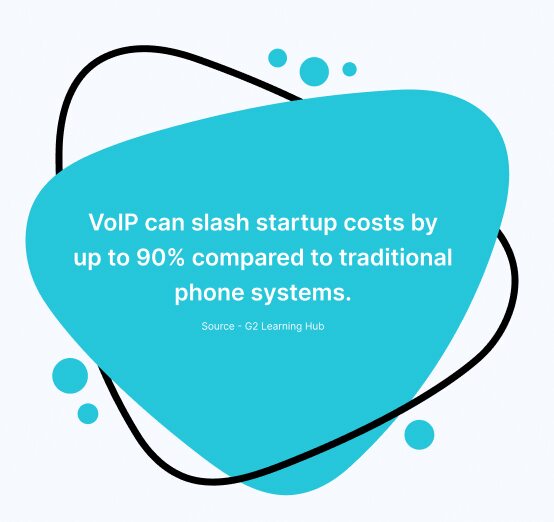
Traditional business phone systems need a massive amount of investment for on-premise installation and setup of PBX hardware. Such installations can cost as much as tens of thousands of dollars. This can be a huge concern for small to mid-sized businesses with only a small number of employees.
However, with VoIP, you don’t have to pay for installation or maintenance. The upgrade, monitoring, and maintenance of the VoIP are done by the VoIP providers offsite in the cloud. And the best part is that it works with your existing desktop and mobile devices.
2. Savings on Calling
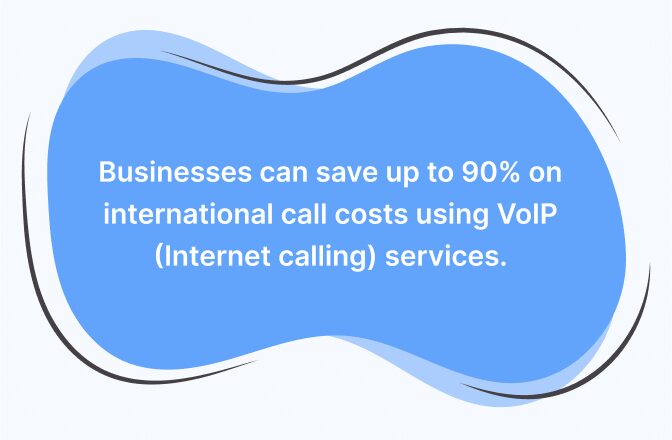
The cost of calling is also a direct cost for your business. VoIP technology can lower your phone bill by significant amounts. VoIP allows long-distance calls at significantly reduced calling rates compared to traditional phone plans that run over PSTN or circuit-switched networks. This is especially beneficial for businesses that deal with overseas clients and teams. Most modern VoIP services offer free and unlimited calls to the U.S. and Canada.
3. Cuts Down on Recurring Expenses
Traditional phone systems come with various other expenses, such as taxes and repairs, that can take a toll on the budget of small business owners. Well, that doesn’t mean that VoIP technology runs without these charges. Rather, VoIP services offer low-cost monthly plans to which a business can subscribe. Service providers roll the extra costs into monthly subscription plans, which might be as little as $5.
Indirect Savings
There are several indirect ways in which VoIP helps businesses save money, however, it is a bit difficult to quantify the same.
- Remote Work Savings
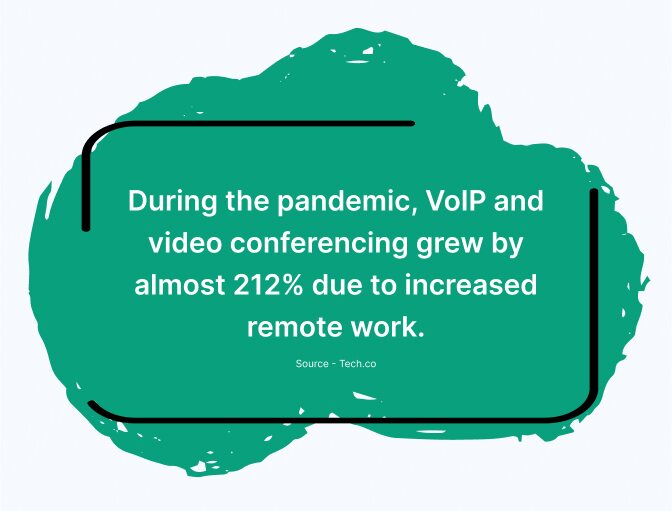
VoIP has revolutionized the workplace. Employees have remote access to a bundle of communication and collaboration features using a VoIP phone system on their internet-enabled devices. This includes auto attendant, conference calling, call recording, business phone numbers, business call routing, call waiting, and a lot more.
With remote access given to employees, companies can not only save on working space and utilities but also enhance employee productivity. According to statistics, VoIP elevates company productivity by up to 20% by enabling calls from anywhere. Indirectly, it adds to the savings because employees are likely to perform better when they can do work in their comfort.
Interesting Fact – American employers can save $11,000 per employee annually by allowing 50% of their work from home to be done with cloud-based VoIP that supports remote access.
2. Access to Extra Features Free of Cost
Compared to traditional phone systems, VoIP offers several useful features and bundles these features into a flat monthly fee. When we look at traditional phone systems, features like call transfer, call queueing, IVR, etc. do not come as standard features; rather, one has to pay separately. But with VoIP, it is altogether different. You don’t need to pay an extra amount of money; you can choose a plan that has features best suited to your needs.
3. Repurposed Workforce

Ever considered the cost of hiring a front desk receptionist or a secretary who handles phone calls and takes messages? Well, this can go anywhere between $40K and $50K a year and is certainly not a small amount, especially if you are a small or mid-sized business.
VoIP gives you an excellent and cheap alternative to this: the Auto Attendant feature. From greeting your callers to helping them navigate the menu options and connect them with the right agents, the auto attendant takes care of everything. Recent studies suggest that “62% of contact centers use automated speech solutions like IVR for customer service.”
-
Increased Accessibility
With VoIP, you only need a stable internet connection to make and receive calls. There’s no mandate to be present inside your physical office space, and yes, there’s no restriction on time as well. You can use VoIP whenever required, and if you are not available to take calls, the call forwarding and voicemail features can be used.
Today, the mobile workforce dominates the work landscape, and the demand for remote access is continuously increasing. VoIP enables employees to use their smartphones and tablets to get mobile access to their business phones and stay productive.
-
Complete Phone Number Portability
No matter where you go, a VoIP phone number, which is also referred to as a virtual business phone number, remains with you. For those who travel a lot for business purposes, this sounds like a major benefit, as they can use the same VoIP number no matter where they are. Additionally, even when your business address changes, your contact number can still be retained and used.
-
Higher Scalability
The next advantage of VoIP on our list is its scalability. Let’s understand the scalability offered by VoIP with the help of an example.
Suppose you are a business that is likely to experience a spike in phone calls during the holidays. You are searching for a business phone system that can accommodate the current call traffic and can also grow as per your requirements. Would you like to go with a phone system that demands a heavy hardware investment? Certainly not! VoIP lets you grow and shrink as per your preferences without investing in dedicated hardware.
-
Advanced Features to Boost Business Growth
VoIP offers access to a wide range of advanced features. This is beneficial for both small and large companies. Features like auto attendant, virtual local phone numbers, call queuing, and call transferring help small teams project the image of a large company.
For instance, if you are a small business based out of New York but serve clientele in New Jersey as well, then you can take a local phone number in New Jersey ( a phone number with the area code of New Jersey). This makes you appear as a local business in front of your customers in New Jersey.
Also, the auto attendant feature makes a small business like yours appear like a big company with multiple departments. This builds confidence among the customers, which certainly adds to business growth.
All these advanced features help increase the communication efficiency of large organizations as well. Features like conference calling help multiple participants join the same call, which boosts communication and collaboration.
-
Clearer Voice Quality
In its early days, VoIP suffered call quality issues like call drops, jitters, and latency. But today, one only needs a fast and reliable internet connection to reap the full benefits of VoIP. As long as you have a robust internet connection, you can enjoy clear and crisp audio, video, and conference calls. Modern-day VoIP phones are equipped with noise-cancellation features that offer superior sound quality.
-
Supports Multitasking
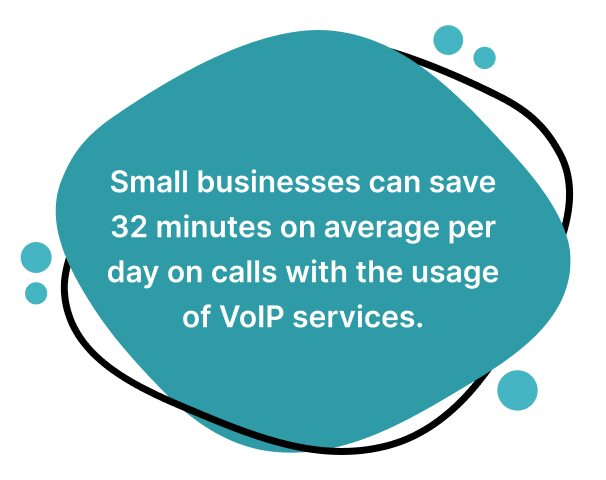
Traditional phone systems allow you to make or receive phone calls, one thing at a time. But VoIP makes you much more efficient, as you can send and receive documents, do messaging, and a lot more while on a call. This makes collaborations like virtual meetings much more meaningful as well as impactful.
-
More Flexibility with Softphones
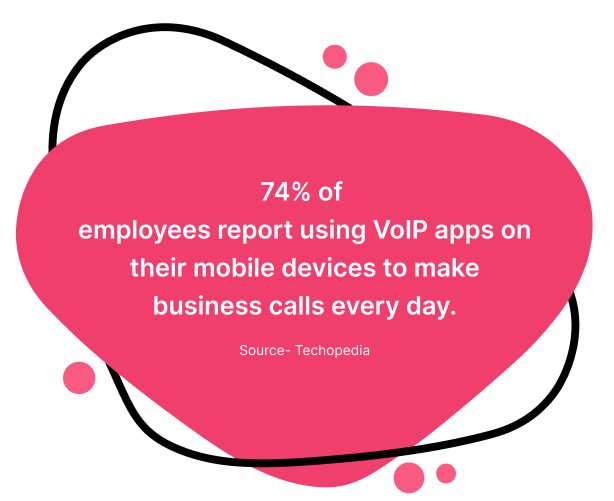
If you have ever used a softphone application such as Skype, you surely know the convenience it offers.
The first is that the softphones are applications that are to be installed on your computer or laptop, which means no hardware is required. This also means that it frees up your desk space and cuts additional equipment expenses. Secondly, these softphones work like your regular phones, which means you can make and receive calls using them. Thirdly, softphones enable teams to stay constantly connected no matter where they are, thus offering more flexibility.
Disadvantages of Using VoIP
We have discussed the advantages of VoIP, now let’s switch to the other side of the coin. By discussing the drawbacks of using VoIP, you will be able to weigh the pros and cons of VoIP in a better way. Let’s take a look:
-
Needs a Reliable Internet Connection
When you use VoIP, the quality and reliability of your calls rely heavily on your internet connection. An internet connection with low network bandwidth is a complete no-no if you want to enjoy VoIP. First, you must consider the number of concurrent calls that you plan to make. Accordingly, you will be able to find the bandwidth that your business needs. A choppy internet connection can cause drops in between the calls, which can lead to frustrating audio glitches.
Interesting Fact – VoIP cuts bandwidth use by 50% just by muting inactive speakers. (Source – G2 Learning Hub)
You can consider fiber internet, cable internet, DSL internet, LTE internet (cellular), and 5G internet (cellular) when planning to use VoIP. It is advisable not to go with satellite and dial-up internet because they have limitations in terms of bandwidth, packet loss, jitter, etc.
-
Susceptible to Network Latency and Jitter
Latency and Jitter are two common issues that you may encounter with an internet-based connection.
Latency refers to the delay between sending and receiving data packets when data transmission happens. A simple example is the delay in conversations, which causes people to talk over each other.
Jitter is the variation in the delay of data packet delivery. When data packets do not travel consistently, it results in uneven voice quality.
To mitigate latency and jitter issues in your VoIP calls, you can mainly do two things:
- Opt for a high-speed internet service so that you have sufficient bandwidth.
- Upgrade your Ethernet cables, i.e., use CAT 5e or CAT 6 on your VoIP devices and computer systems
-
Not Suitable for Emergency Situations
VoIP is completely dependable on a constant supply of power because it works over the internet. While the regular traditional phone makes use of copper wires, they work even when the power goes out. So even if there’s a blackout, you can still make calls using a landline phone, but this is not possible with VoIP. You have two options to choose from: either wait for the power to be restored or consider investing in a backup power supply.
Another downside of VoIP is location tracking. This happens because we can use VoIP from anywhere with internet access. VoIP calls only show an IP address, which makes it hard for others to find out the originating location of the call. While this location information is not needed in most of the calls, in case of an emergency, it becomes a problem. Suppose you dial 911 using a VoIP call. In such a case, you’ll need to tell the emergency responders about your exact location.
-
Security Issues
The cyberworld is full of malicious actors executing one or more attack techniques to cause harm. VoIP being reliant on the Internet makes it vulnerable to various cyber-attacks, including Phishing, Denial of Service attacks (DoS), Distributed Denial of Service Attacks (DDoS), Man-in-Middle-Attacks (MitM), SQL Injection, Malware attacks, etc.
However, modern-day VoIP security mechanisms like end-to-end encryption, and 2-factor authentication can be implemented to keep cyberattacks at bay. According to EnterpriseAppsToday, “94% of businesses reported enhanced security after switching to cloud-based systems, which often include VoIP services.”
Why Use VoIP for Business?
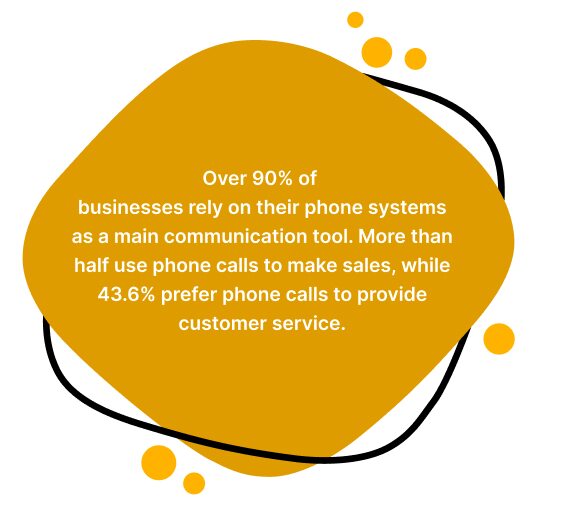
Weighing the pros and cons of VoIP, we can say that for businesses that are small in size, provide customer support services, or have intense business communication requirements, VoIP offers a compelling package. From cost-cutting to improved call management, its ability to seamlessly support remote work certainly outweighs the few drawbacks it offers.
How to Select the Right VoIP Provider?
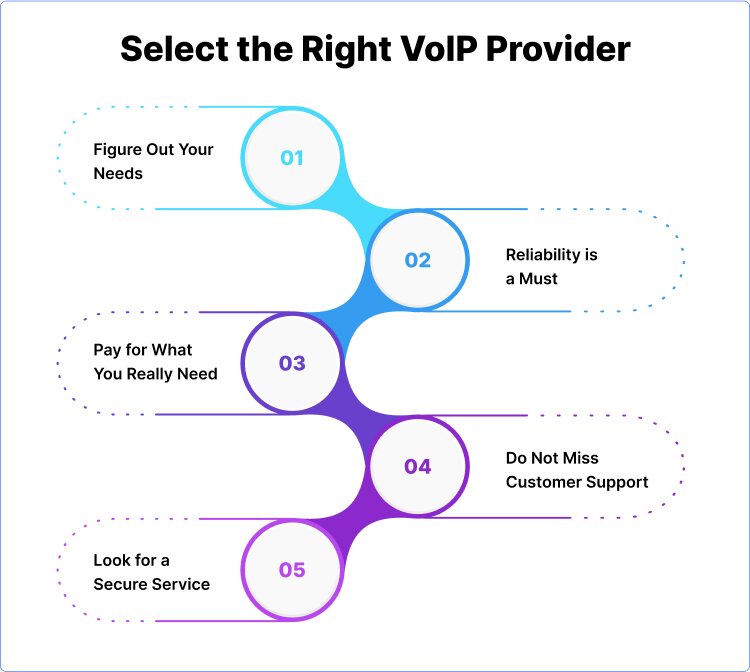
The market is loaded with different options, which means you need to be very careful with your choices. One important point to keep in mind is that not all services are made equal, and VoIP is no exception. When choosing the right VoIP provider for your business, do consider the following aspects:
Figure Out Your Needs
The first thing to do is analyze your business communication and identify your requirements. This includes the different types of features you need in your VoIP phone system, such as an auto attendant, call routing, call recording, analytics, and voicemail. Additionally, you may decide upon the types of business phone numbers you need, such as local numbers, vanity phone numbers, toll-free numbers, etc.
Reliability is a Must
As a business, you want your service to be up and running all the time. Downtime can damage operations as well as your reputation. So it’s a must to look for a VoIP provider who guarantees 99.99% uptime. Yes, the best service providers offer that!
Pay for What You Really Need
Evaluate the different pricing plans offered by the VoIP providers. Look for a plan that has almost everything you need so that you can pay for what you use.
Do Not Miss Customer Support
You must recognize that problems can sometimes arise even with the best systems; therefore, customer support and troubleshooting services are essential. Look for a VoIP provider with 24/7 customer support.
Look for a Secure Service
Checking the safety aspects of the VoIP platform is another important step. Check if the service provider has any history of data breaches or leakages. You may ask the provider about the security policies implemented by them.
Key Takeaway
Before we bring our discussion surrounding VoIP advantages and disadvantages to an end, I would like to mention a few interesting facts:
- Statistics reveal that “83% of companies have lost customers, missed deadlines, or fired employees because of communication problems.”
- Dell was able to save $39.5 million by relying on telecommuting while cutting down on carbon pollution to boot.
- In 2022, a data breach attack on T-Mobile cost the company $350 million.
The first fact underscores the importance of an efficient and robust phone system in place in a business setup. The second fact showcases the cost-effectiveness of VoIP for modern businesses. The third fact tells us that challenges like reliability and security persist in VoIP. However, despite these concerns, VoIP continues to revolutionize the way we connect and collaborate.
Finally, I would like to conclude by saying that you must weigh the VoIP advantages and disadvantages to make informed decisions that optimize the efficiency and effectiveness of business communication.




























